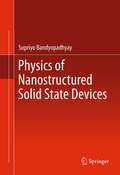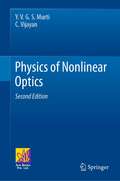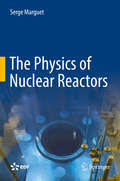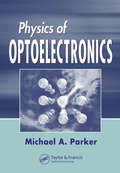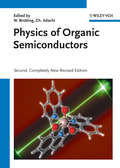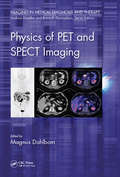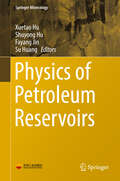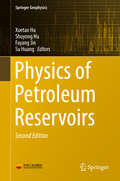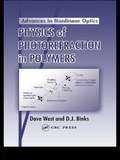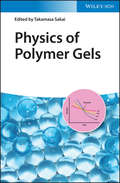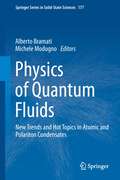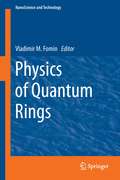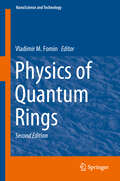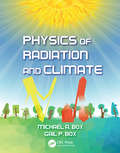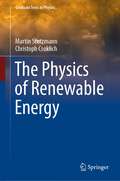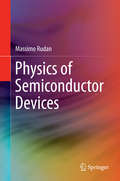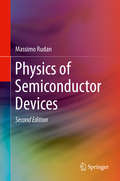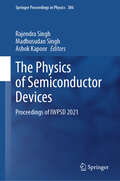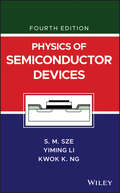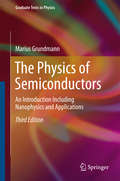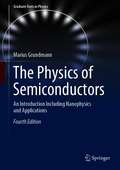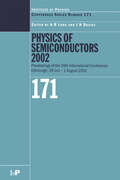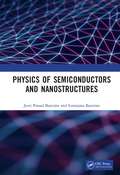- Table View
- List View
Physics of Nanostructured Solid State Devices
by Supriyo BandyopadhyayPhysics of Nanostructured Solid State Devices introduces readers to theories and concepts such as semi-classical and quantum mechanical descriptions of electron transport, methods for calculations of band structures in solids with applications in calculation of optical constants, and other advanced concepts. The information presented here will equip readers with the necessary tools to carry out cutting edge research in modern solid state nanodevices.
Physics of Nonlinear Optics
by Y. V. Murti C. VijayanThe book is designed to serve as a textbook for courses offered to upper-undergraduate students enrolled in physics. The first edition of this book was published in 2014. As there is a demand for the next edition, it is quite natural to take note of the several advances that have occurred in the subject over the past five years and to decide which of these are appropriate for inclusion at the textbook level, given the fundamental nature and the significance of the subject area. This is the prime motivation for bringing out a revised second edition. Among the newer mechanisms and materials, the book introduces the super-continuum generation, which arises from an excellent interplay of the various mechanisms of optical nonlinearity. The topics covered in this book are quantum mechanics of nonlinear interaction of matter and radiation, formalism and phenomenology of nonlinear wave mixing processes, optical phase conjugation and applications, self-focusing and self-phase modulation and their role in pulse modification, nonlinear absorption mechanisms, and optical limiting applications, photonic switching and bi-stability, and physical mechanisms leading to a nonlinear response in a variety of materials. This book has emerged from an attempt to address the requirement of presenting the subject at the college level. This textbook includes rigorous features such as the elucidation of relevant basic principles of physics; a clear exposition of the ideas involved at an appropriate level; coverage of the physical mechanisms of non-linearity; updates on physical mechanisms and emerging photonic materials and emphasis on the experimental study of nonlinear interactions. The detailed coverage and pedagogical tools make this an ideal textbook for students and researchers enrolled in physics and related courses.
The Physics of Nuclear Reactors
by Serge MarguetThis comprehensive volume offers readers a progressive and highly detailed introduction to the complex behavior of neutrons in general, and in the context of nuclear power generation. A compendium and handbook for nuclear engineers, a source of teaching material for academic lecturers as well as a graduate text for advanced students and other non-experts wishing to enter this field, it is based on the author’s teaching and research experience and his recognized expertise in nuclear safety.After recapping a number of points in nuclear physics, placing the theoretical notions in their historical context, the book successively reveals the latest quantitative theories concerning:• The slowing-down of neutrons in matter• The charged particles and electromagnetic rays• The calculation scheme, especially the simplification hypothesis• The concept of criticality based on chain reactions• The theory of homogeneous and heterogeneous reactors• The problem of self-shielding• The theory of the nuclear reflector, a subject largely ignored in literature• The computational methods in transport and diffusion theories Complemented by more than 400 bibliographical references, some of which are commented and annotated, and augmented by an appendix on the history of reactor physics at EDF (Electricité De France), this book is the most comprehensive and up-to-date introduction to and reference resource in neutronics and reactor theory.
Physics of Optoelectronics (Optical Science and Engineering)
by Michael A. ParkerPhysics of Optoelectronics focuses on the properties of optical fields and their interaction with matter. Understanding that lasers, LEDs, and photodetectors clearly exemplify this interaction, the author begins with an introduction to lasers, LEDs, and the rate equations, then describes the emission and detection processes.The book summarizes and reviews the mathematical background of the quantum theory embodied in the Hilbert space. These concepts highlight the abstract form of the linear algebra for vectors and operators, supplying the "pictures" that make the subject more intuitive. A chapter on dynamics includes a brief review of the formalism for discrete sets of particles and continuous media. It also covers the quantum theory necessary for the study of optical fields, transitions, and semiconductor gain. This volume supplements the description of lasers and LEDs by examining the fundamental nature of the light that these devices produce. It includes an analysis of quantized electromagnetic fields and illustrates inherent quantum noise in terms of Poisson and sub-Poisson statistics. It explains matter-light interaction in terms of time-dependent perturbation theory and Fermi's golden rule, and concludes with a detailed discussion of semiconductor emitters and detectors.
Physics of Organic Semiconductors
by Wolfgang Brütting Chihaya AdachiThe field of organic electronics has seen a steady growth over the last 15 years. At the same time, our scientific understanding of how to achieve optimum device performance has grown, and this book gives an overview of our present-day knowledge of the physics behind organic semiconductor devices. Based on the very successful first edition, the editors have invited top scientists from the US, Japan, and Europe to include the developments from recent years, covering such fundamental issues as: - growth and characterization of thin films of organic semiconductors, - charge transport and photophysical properties of the materials as well as their electronic structure at interfaces, and - analysis and modeling of devices like organic light-emitting diodes or organic lasers. The result is an overview of the field for both readers with basic knowledge and for an application-oriented audience. It thus bridges the gap between textbook knowledge largely based on crystalline molecular solids and those books focusing more on device applications.
Physics of PET and SPECT Imaging (Imaging in Medical Diagnosis and Therapy)
by Magnus DahlbomPET and SPECT imaging has improved to such a level that they are opening up exciting new horizons in medical diagnosis and treatment. This book provides a complete introduction to fundamentals and the latest progress in the field, including an overview of new scintillator materials and innovations in photodetector development, as well as the latest system designs and image reconstruction algorithms. It begins with basics of PET and SPECT physics, followed by technology advances and computing methods, quantitative techniques, multimodality imaging, instrumentation, pre-clinical and clinical imaging applications.
Physics of Petroleum Reservoirs
by Xuetao Hu Shuyong Hu Fayang Jin Su HuangThis book introduces in detail the physical and chemical phenomena and processes during petroleum production. It covers the properties of reservoir rocks and fluids, the related methods of determining these properties, the phase behavior of hydrocarbon mixtures, the microscopic mechanism of fluids flowing through reservoir rocks, and the primary theories and methods of enhancing oil recovery. It also involves the up-to-date progress in these areas. It can be used as a reference by researchers and engineers in petroleum engineering and a textbook for students majoring in the area related with petroleum exploitation.
Physics of Petroleum Reservoirs
by Xuetao Hu Shuyong Hu Fayang Jin Su HuangThis book introduces in detail the physical and chemical phenomena and processes during petroleum production. It covers the properties of reservoir rocks and fluids, the related methods of determining these properties, the phase behavior of hydrocarbon mixtures, the microscopic mechanism of fluids flowing through reservoir rocks, and the primary theories and methods of enhancing oil recovery. It also involves the up-to-date progress in these areas. It can be used as a reference by researchers and engineers in petroleum engineering and a textbook for students majoring in the area related with petroleum exploitation.
Physics of Petroleum Reservoirs (Springer Mineralogy)
by Xuetao Hu, Shuyong Hu, Fayang Jin and Su HuangThis book introduces in detail the physical and chemical phenomena and processes during petroleum production. It covers the properties of reservoir rocks and fluids, the related methods of determining these properties, the phase behavior of hydrocarbon mixtures, the microscopic mechanism of fluids flowing through reservoir rocks, and the primary theories and methods of enhancing oil recovery. It also involves the up-to-date progress in these areas. It can be used as a reference by researchers and engineers in petroleum engineering and a textbook for students majoring in the area related with petroleum exploitation.
Physics of Photorefraction in Polymers (Advances in Nonlinear Optics)
by Dave West D.J. BinksPhotorefractive polymer composites are an unusually sensitive class of photopolymers. Physics of Photorefraction in Polymers describes our current understanding of the physical processes that produce a photorefractive effect in key composite materials. Topics as diverse as charge generation, dispersive charge transport, charge compensation and trapping, molecular diffusion, organic composite structure, and nonlinear optical wave coupling are all developed from a physical perspective. Emphasis is placed on explaining how these physical processes lead to observable properties of the polymers, and the authors discuss various applications, including holographic archiving.
Physics of Polymer Gels
by Takamasa SakaiExplains the correlation between the physical properties and structure of polymer gels This book elucidates in detail the physics of polymer gels and reviews their unique properties that make them attractive for innumerable applications. Geared towards experienced researchers and entrants to the field, it covers rubber elasticity, swelling and shrinking, deformation and fracture of as well as mass transport in polymer gels, enabling the readers to purposefully design polymer gels fit for specific purposes. Divided into two parts, Physics of Polymer Gels starts by explaining the statistical mechanics and scaling of a polymer chains, and that of polymer solutions. It then introduces the structure of polymer gels and explains the rubber elasticity, which predicts the solid-like nature of polymer gels. Next, it describes swelling/deswelling, which can be understood by combining the rubber elasticity and the osmotic pressure of a polymer solution. Large deformation and fracture, and the diffusion of substances in polymer gels, which are essential for practical applications, are also introduced. The last half of the book contains the authors' experimental results using Tetra-PEG gels and provides readers with the opportunity to examine and compare it with the first half in order to understand how to utilize the models to experiments. This title: Is the first book dedicated to the physics of polymer gels Describes in detail the properties of polymer gels and their underlying physics, facilitating the development of novel, polymer gel-based applications Serves as a reference for all relevant polymer gel properties and their underlying physics Provides a unified treatment of the subject, explaining the physical properties of polymer gels within a common nomenclature framework Physics of Polymer Gels is a must-have book for experienced researchers, such as polymer chemists, materials scientists, organic chemists, physical chemists, and solid-state physicists, as well as for newcomers to the field.
Physics of Quantum Fluids: New Trends and Hot Topics in Atomic and Polariton Condensates
by Alberto Bramati Michele ModugnoThe study of quantum fluids, stimulated by the discovery of superfluidity in liquid helium, has experienced renewed interest after the observation of Bose-Einstein condensation (BEC) in ultra-cold atomic gases and the observation a new type of quantum fluid with specific characteristics derived from its intrinsic out-of-equilibrium nature. The main objective of this book is to take a snapshot of the state-of-the-art of this fast moving field with a special emphasis on the hot topics and new trends. Bringing together the most active specialists of the two areas (atomic and polaritonic quantum fluids), we expect that this book will facilitate the exchange and the collaboration between these two communities working on subjects with very strong analogies.
Physics of Quantum Rings
by Vladimir FominThis book deals with a new class of materials, quantum rings. Innovative recent advances in experimental and theoretical physics of quantum rings are based on the most advanced state-of-the-art fabrication and characterization techniques as well as theoretical methods. The experimental efforts allow to obtain a new class of semiconductor quantum rings formed by capping self-organized quantum dots grown by molecular beam epitaxy. Novel optical and magnetic properties of quantum rings are associated with non-trivial topologies at the nanoscale. An adequate characterization of quantum rings is possible on the basis of modern characterization methods of nanostructures, such as Scanning Tunneling Microscopy. A high level of complexity is demonstrated to be needed for a dedicated theoretical model to adequately represent the specific features of quantum rings. The findings presented in this book contribute to develop low-cost high-performance electronic, spintronic, optoelectronic and information processing devices based on quantum rings.
Physics of Quantum Rings (NanoScience and Technology)
by Vladimir M. FominThis book, now in its second edition, introduces readers to quantum rings as a special class of modern high-tech material structures at the nanoscale. It deals, in particular, with their formation by means of molecular beam epitaxy and droplet epitaxy of semiconductors, and their topology-driven electronic, optical and magnetic properties. A highly complex theoretical model is developed to adequately represent the specific features of quantum rings. The results presented here are intended to facilitate the development of low-cost high-performance electronic, spintronic, optoelectronic and information processing devices based on quantum rings. This second edition includes both new and significantly revised chapters. It provides extensive information on recent advances in the physics of quantum rings related to the spin-orbit interaction and spin dynamics (spin interference in Rashba rings, tunable exciton topology on type II InAs/GaAsSb quantum nanostructures), the electron-phonon interaction in ring-like structures, quantum interference manifestations in novel materials (graphene nanoribbons, MoS2), and the effects of electrical field and THz radiation on the optical properties of quantum rings. The new edition also shares insights into the properties of various novel architectures, including coupled quantum ring-quantum dot chains and concentric quantum rings, topologic states of light in self-assembled ring-like cavities, and optical and plasmon m.odes in Möbius-shaped resonators.
Physics of Radiation and Climate
by Michael A. Box Gail P. BoxOur current climate is strongly influenced by atmospheric composition, and changes in this composition are leading to climate change. Physics of Radiation and Climate takes a look at how the outward flow of longwave or terrestrial radiation is affected by the complexities of the atmosphere's molecular spectroscopy. This book examines the planet in
Physics of Radio-Frequency Plasmas
by Pascal Chabert Nicholas BraithwaiteLow-temperature radio frequency plasmas are essential in various sectors of advanced technology, from micro-engineering to spacecraft propulsion systems and efficient sources of light. The subject lies at the complex interfaces between physics, chemistry and engineering. Focusing mostly on physics, this book will interest graduate students and researchers in applied physics and electrical engineering. The book incorporates a cutting-edge perspective on RF plasmas. It also covers basic plasma physics including transport in bounded plasmas and electrical diagnostics. Its pedagogic style engages readers, helping them to develop physical arguments and mathematical analyses. Worked examples apply the theories covered to realistic scenarios, and over 100 in-text questions let readers put their newly acquired knowledge to use and gain confidence in applying physics to real laboratory situations.
The Physics of Renewable Energy (Graduate Texts in Physics)
by Martin Stutzmann Christoph CsoklichThis book provides a concise overview of the physical basics of different forms of renewable energy (water, waves, wind, solar, thermal, geothermal, biofuels), focusing on the physical limits for the efficiency and energy densities of different current technologies. It also discusses relevant aspects of materials science, physical chemistry, and biophysics. The book is based on the lecture notes of a course taught at TU München to undergraduate and graduate students of Applied Physics and related engineering disciplines. It provides material that can be taught in a one-semester course with 4 hours per week and includes a self-test section to enable students to check their understanding.
Physics of Semiconductor Devices
by Massimo RudanThis book describes the basic physics of semiconductors, including the hierarchy of transport models, and connects the theory with the functioning of actual semiconductor devices. Details are worked out carefully and derived from the basic physics, while keeping the internal coherence of the concepts and explaining various levels of approximation. Examples are based on silicon due to its industrial importance. Several chapters are included that provide the reader with the quantum-mechanical concepts necessary for understanding the transport properties of crystals. The behavior of crystals incorporating a position-dependent impurity distribution is described, and the different hierarchical transport models for semiconductor devices are derived (from the Boltzmann transport equation to the hydrodynamic and drift-diffusion models). The transport models are then applied to a detailed description of the main semiconductor-device architectures (bipolar, MOS). The final chapters are devoted to the description of some basic fabrication steps, and to measuring methods for the semiconductor-device parameters.
Physics of Semiconductor Devices
by Massimo RudanThis book describes the basic physics of semiconductors, including the hierarchy of transport models, and connects the theory with the functioning of actual semiconductor devices. Details are worked out carefully and derived from the basic physics, while keeping the internal coherence of the concepts and explaining various levels of approximation. Examples are based on silicon due to its industrial importance. Several chapters are included that provide the reader with the quantum-mechanical concepts necessary for understanding the transport properties of crystals. The behavior of crystals incorporating a position-dependent impurity distribution is described, and the different hierarchical transport models for semiconductor devices are derived (from the Boltzmann transport equation to the hydrodynamic and drift-diffusion models). The transport models are then applied to a detailed description of the main semiconductor-device architectures (bipolar, MOS). The final chapters are devoted to the description of some basic fabrication steps, and to measuring methods for the semiconductor-device parameters.
The Physics of Semiconductor Devices: Proceedings of IWPSD 2021 (Springer Proceedings in Physics #306)
by Rajendra Singh Madhusudan Singh Ashok KapoorThis book includes proceedings of the 21st International Workshop on Physics of Semiconductor Devices. The workshop is jointly organized by the Indian Institute of Technology, Delhi, and Solid State Physics Laboratory, Delhi, in collaboration with the Society for Semiconductor Devices and Semiconductor Society of India. This book disseminates the current knowledge of semiconductor physics and its applications across the scientific community. It is based on a biennial workshop that provides the participating research groups with a stimulating platform for interaction and collaboration with colleagues from the same scientific community. The book discusses the latest developments in III-nitrides; materials and devices, compound semiconductors, VLSI technology, optoelectronics, sensors, photovoltaics, crystal growth, epitaxy, and characterization, graphene, and other 2D materials and organic semiconductors. The research articles included in this book are contributed by various eminent scientists from all over the world. The book serves as a reference resource for researchers and practitioners in academia and industry.
Physics of Semiconductor Devices
by Simon M. Sze Kwok K. Ng Yiming LiThe new edition of the most detailed and comprehensive single-volume reference on major semiconductor devices The Fourth Edition of Physics of Semiconductor Devices remains the standard reference work on the fundamental physics and operational characteristics of all major bipolar, unipolar, special microwave, and optoelectronic devices. This fully updated and expanded edition includes approximately 1,000 references to original research papers and review articles, more than 650 high-quality technical illustrations, and over two dozen tables of material parameters. Divided into five parts, the text first provides a summary of semiconductor properties, covering energy band, carrier concentration, and transport properties. The second part surveys the basic building blocks of semiconductor devices, including p-n junctions, metal-semiconductor contacts, and metal-insulator-semiconductor (MIS) capacitors. Part III examines bipolar transistors, MOSFETs (MOS field-effect transistors), and other field-effect transistors such as JFETs (junction field-effect-transistors) and MESFETs (metal-semiconductor field-effect transistors). Part IV focuses on negative-resistance and power devices. The book concludes with coverage of photonic devices and sensors, including light-emitting diodes (LEDs), solar cells, and various photodetectors and semiconductor sensors. This classic volume, the standard textbook and reference in the field of semiconductor devices: Provides the practical foundation necessary for understanding the devices currently in use and evaluating the performance and limitations of future devices Offers completely updated and revised information that reflects advances in device concepts, performance, and application Features discussions of topics of contemporary interest, such as applications of photonic devices that convert optical energy to electric energy Includes numerous problem sets, real-world examples, tables, figures, and illustrations; several useful appendices; and a detailed solutions manual Explores new work on leading-edge technologies such as MODFETs, resonant-tunneling diodes, quantum-cascade lasers, single-electron transistors, real-space-transfer devices, and MOS-controlled thyristors Physics of Semiconductor Devices, Fourth Edition is an indispensable resource for design engineers, research scientists, industrial and electronics engineering managers, and graduate students in the field.
The Physics of Semiconductors
by Marius GrundmannThe 3rd edition of this successful textbook contains ample material for a comprehensive upper-level undergraduate or beginning graduate course, guiding readers to the point where they can choose a special topic and begin supervised research. The textbook provides a balance between essential aspects of solid-state and semiconductor physics, on the one hand, and the principles of various semiconductor devices and their applications in electronic and photonic devices, on the other. It highlights many practical aspects of semiconductors such as alloys, strain, heterostructures, nanostructures, that are necessary in modern semiconductor research but typically omitted in textbooks. Coverage also includes additional advanced topics, such as Bragg mirrors, resonators, polarized and magnetic semiconductors, nanowires, quantum dots, multi-junction solar cells, thin film transistors, carbon-based nanostructures and transparent conductive oxides. The text derives explicit formulas for many results to support better understanding of the topics. The Physics of Semiconductors requires little or no prior knowledge of solid-state physics and evolved from a highly regarded two-semester course. In the third edition several topics are extended and treated in more depth including surfaces, disordered materials, amorphous semiconductors, polarons, thermopower and noise. More than 1800 references guide the reader to historic and current literature including original and review papers and books.
The Physics of Semiconductors: An Introduction Including Nanophysics and Applications (Graduate Texts in Physics)
by Marius GrundmannThe 4th edition of this highly successful textbook features copious material for a complete upper-level undergraduate or graduate course, guiding readers to the point where they can choose a specialized topic and begin supervised research. The textbook provides an integrated approach beginning from the essential principles of solid-state and semiconductor physics to their use in various classic and modern semiconductor devices for applications in electronics and photonics. The text highlights many practical aspects of semiconductors: alloys, strain, heterostructures, nanostructures, amorphous semiconductors, and noise, which are essential aspects of modern semiconductor research but often omitted in other textbooks. This textbook also covers advanced topics, such as Bragg mirrors, resonators, polarized and magnetic semiconductors, nanowires, quantum dots, multi-junction solar cells, thin film transistors, and transparent conductive oxides. The 4th edition includes many updates and chapters on 2D materials and aspects of topology. The text derives explicit formulas for many results to facilitate a better understanding of the topics. Having evolved from a highly regarded two-semester course on the topic, The Physics of Semiconductors requires little or no prior knowledge of solid-state physics. More than 2100 references guide the reader to historic and current literature including original papers, review articles and topical books, providing a go-to point of reference for experienced researchers as well.
Physics of Semiconductors 2002: Proceedings of the 26th International Conference, Edinburgh, 29 July to 2 August 2002 (Institute of Physics Conference Series)
by A R Long J H DaviesThe 26th International Conference on the Physics of Semiconductors was held from 29 July to 2 August 2002 at the Edinburgh International Conference Centre. It is the premier meeting in the field of semiconductor physics and attracted over 1000 participants from leading academic, governmental and industrial institutions in some 50 countries around the world. Plenary and invited papers (34) have been printed in the paper volume, and all submitted papers (742) are included on the downloadable resources.These proceedings provide an international perspective on the latest research and a review of recent developments in semiconductor physics. Topics range from growth and properties of bulk semiconductors to the optical and transport properties of semiconductor nanostructures. There are 742 papers, mostly arranged in chapters on Bulk, dynamics, defects and impurities, growth (147); Heterostructures, quantum wells, superlattices - optical (138); Heterostructures, quantum wells, superlattices - transport (97); Quantum nanostructures - optical (120); Quantum nanostructures - transport (85); New materials and concepts (52); Novel devices (43); and Spin and magnetic effects (48). A number of trends were identified in setting up the overall programme of the conference. There were significant contributions from new directions of research such as nanostructures and one-dimensional physics; spin effects and ferromagnetism; and terahertz and subband physics. These complemented areas in which the conference has traditional strengths, such as defects and bulk materials; crystal growth; quantum transport; and optical properties.As a record of a conference that covers the whole range of semiconductor physics, this book is an essential reference for researchers working on semiconductor physics, device physics, materials science, chemistry, and electronic and electrical engineering.
Physics of Semiconductors and Nanostructures
by Jyoti Prasad Banerjee Suranjana BanerjeeThis book is a comprehensive text on the physics of semiconductors and nanostructures for a large spectrum of students at the final undergraduate level studying physics, material science and electronics engineering. It offers introductory and advanced courses on solid state and semiconductor physics on one hand and the physics of low dimensional semiconductor structures on the other in a single text book. Key Features Presents basic concepts of quantum theory, solid state physics, semiconductors, and quantum nanostructures such as quantum well, quantum wire, quantum dot and superlattice In depth description of semiconductor heterojunctions, lattice strain and modulation doping technique Covers transport in nanostructures under an electric and magnetic field with the topics: quantized conductance, Coulomb blockade, and integer and fractional quantum Hall effect Presents the optical processes in nanostructures under a magnetic field Includes illustrative problems with hints for solutions in each chapter Physics of Semiconductors and Nanostructures will be helpful to students initiating PhD work in the field of semiconductor nanostructures and devices. It follows a unique tutorial approach meeting the requirements of students who find learning the concepts difficult and want to study from a physical perspective.
